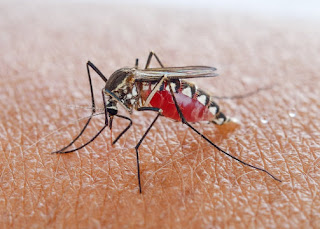Insulin can increase mosquitoes' immunity to West Nile virus
Mosquito nibbles are the most widely recognized way people are contaminated with flaviviruses, an infection family that incorporates West Nile, dengue and Zika. In people, both West Nile and dengue can bring about serious sickness, even passing. Zika has been connected to birth surrenders when pregnant ladies are tainted.
"It's extremely significant that we have a type of security against these ailments in light of the fact that as of now, we don't have any medicines. In case we're ready to stop the disease at the degree of the mosquito, at that point people wouldn't get the infection," said Laura Ahlers, the examination's lead writer and an ongoing Ph.D. move on from WSU. Ahlers is presently a post-doctoral individual with the National Institutes of Health in Bethesda, Maryland.
Working first with organic product flies, which have comparative safe reactions to mosquitoes, Ahlers and her partners recognized an insulin-like receptor in the creepy crawlies that, when enacted, hinders the replication of the West Nile infection in the flies. The specialists at that point inspired this equivalent reaction in mosquitoes by nourishing them blood containing raised insulin. Resulting tests indicated actuating this receptor was additionally successful in smothering dengue and Zika in creepy crawly cells.
While it was at that point realized that insulin helps insusceptible reactions in mosquitoes, this is the first run through insulin's association with a specific safe reaction pathway, called JAK/STAT, has been distinguished. It is a huge advance toward the long haul objective of making a mediation, said Alan Goodman, WSU aide teacher and the comparing creator on the paper.
"On the off chance that we can enact this arm of insusceptibility through the insulin receptor in the mosquito, we can diminish the general viral burden in the mosquito populace," Goodman said. "In the event that the mosquitoes are conveying less infection when they chomp you, they will transmit less of the infection, and there's a superior possibility you won't get the sickness."
"It's extremely significant that we have a type of security against these ailments in light of the fact that as of now, we don't have any medicines. In case we're ready to stop the disease at the degree of the mosquito, at that point people wouldn't get the infection," said Laura Ahlers, the examination's lead writer and an ongoing Ph.D. move on from WSU. Ahlers is presently a post-doctoral individual with the National Institutes of Health in Bethesda, Maryland.
Working first with organic product flies, which have comparative safe reactions to mosquitoes, Ahlers and her partners recognized an insulin-like receptor in the creepy crawlies that, when enacted, hinders the replication of the West Nile infection in the flies. The specialists at that point inspired this equivalent reaction in mosquitoes by nourishing them blood containing raised insulin. Resulting tests indicated actuating this receptor was additionally successful in smothering dengue and Zika in creepy crawly cells.
While it was at that point realized that insulin helps insusceptible reactions in mosquitoes, this is the first run through insulin's association with a specific safe reaction pathway, called JAK/STAT, has been distinguished. It is a huge advance toward the long haul objective of making a mediation, said Alan Goodman, WSU aide teacher and the comparing creator on the paper.
"On the off chance that we can enact this arm of insusceptibility through the insulin receptor in the mosquito, we can diminish the general viral burden in the mosquito populace," Goodman said. "In the event that the mosquitoes are conveying less infection when they chomp you, they will transmit less of the infection, and there's a superior possibility you won't get the sickness."
Email us at: clinicalmicrobiology@pulsusgathering.com




Comments
Post a Comment